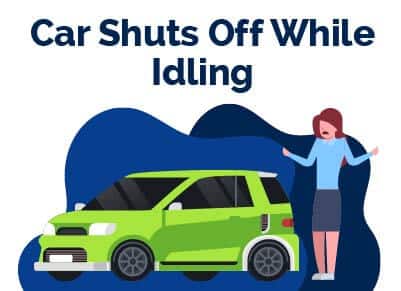Top 8 Causes of Cars Shutting Off While Idling (And What To Do About It)
February 8, 2024


I am a serial entrepreneur and a consumer advocate. When I’m not helping car buyers, I love working on ventures that have a positive impact.
I run a cause marketing agency and serve on the board of Vayu Global Health where we are disrupting the medical industry and preventing the needless deaths of mothers and babies during childbirth.
Does your car shut off while idling?
If you experience this vehicle malfunction, then you should address it before things get worse.
Learn the top 8 reasons why your car shuts down while idling and practice solutions to address it.
Key Takeaways
The top 8 reasons why your vehicle shuts off while idling are:
- Lacking air
- Faulty oxygen sensor
- Mass air flow sensor problems
- Clogged exhaust gas recirculation valve
- Lack of fuel
- Faulty Torque Converter
- Spark plug issues
- Transmission problems
Table of Contents
- Key Takeaways
- Reasons Car Shuts Off While Idling Video
- What Does It Mean When Your Car Shuts Off While Idling?
- Why Does My Car Die While Idling and Then Restart?
- The Top Reasons a Vehicle Stalls While Idling
- What To Do if My Car Shuts Off While Idling?
- Address the Problem Right Away
- When To Avoid Idling
- Is Idling Bad for My Car?
- Conclusion
- Best Car Deals by Category
- Frequently Asked Questions
Reasons Car Shuts Off While Idling Video
What Does It Mean When Your Car Shuts Off While Idling?
It can be very frustrating to have your car suddenly stop working while driving at low speeds or idle.
There are several reasons your car shuts off while idling, and it can be hard to identify the exact cause of this issue.
However, it typically means you have something wrong with your engine.
Regardless of the reason, dealing with the problem quickly is imperative. It's often best to bring the car to the mechanic for a thorough assessment and repair.
Why Does My Car Die While Idling and Then Restart?
Does your car eventually come back on after shutting off during idling? This may signify a specific issue. Here are the various situations to help diagnose this problem:
Car Dies While Idling in Park
Cars that shut off while in park often have serious issues, typically with the transmission. The issue could be simple, like low fluids, but it may also involve a costly repair.
Car Dies While Idling in Drive
When a car dies while idling in "drive", it can cause serious issues. For example, imagine this happens while sitting in traffic. If this is happening, seek professional assistance as soon as possible.
Car Shuts off While Idling With AC On
If this happens, then the Idle Air Control (IAC) may be to blame. Poor flow or build-up in this component strains the vehicle's system and may lead to the car turning off when idling with AC on.
The Top Reasons a Vehicle Stalls While Idling
There are numerous potential reasons for a car to shut down while idling including:
1. Not Enough Air
The airflow in and around your car's engine is crucial to its operation. If there's a lack of oxygen, it can affect the efficiency of the engine.
Poor airflow can cause the car to stall.
2. Faulty Oxygen Sensor
The car's oxygen sensor measures the oxygen level in the exhaust as it leaves the engine.
It then passes this information to the control unit, which then regulates the amount of air that's going into the car's engine. If the sensor is not working correctly, it can cause the engine to stop working.
A new oxygen sensor can cost around $100, though the exact cost depends on the make and model of your car. It can take around an hour to install.
3. Mass Air Flow Sensor Problems
A different type of sensor, the mass air flow sensor, also measures the airflow in and around the engine.
However, it doesn't monitor the oxygen levels from the exhaust; it only monitors the oxygen going in. In the case of inaccurate readings, this can cause the control unit to malfunction.
Depending on the make and model of your car, the cost of a new mass air flow sensor can range from $50 to $400.
However, its installation is relatively easy and typically adds no more than $50 in labor costs.
4. Clogged Exhaust Gas Recirculation Valve
This component is commonly found in diesel engines, though it can also be found in newer gasoline models.
When the engine runs, the exhaust gas recirculation valve allows small amounts of exhaust to flow back into the system to cool the engine. Since carbon dioxide doesn't burn, this process helps the engine run smoothly and safely.
Unfortunately, over time, debris can get stuck in the exhaust's stream, clogging the valve.
This can prevent it from regulating exhaust flow through the engine, which can cause the car to stall.
Getting the car's exhaust gas recirculation valve fixed can be as simple as washing it out at home. However, if the valve is faulty, replacing it can cost around $500.
5. Lack of Fuel
When your car stops working while you're driving, your first thought might be that there's something wrong with the fuel delivery system of your vehicle. if there's a problem with the fuel supply, it could cause the engine to stall.
The fuel delivery system of your car is composed of various components, such as pumps, sensors, and filters.
Regularly inspect your vehicle's fuel delivery system to make sure that it's working correctly.
6. Faulty Torque Converter
If you have a faulty torque converter, then the clutch won't be able to power the wheels. The engine will struggle to slow down properly, leading to it shutting down.
7. Spark Plugs
An essential component of your vehicle is a spark plug, which is the part of the ignition system that ignites the combustion process.
When the fuel injectors are pushed into the chamber, the spark plugs light up the gas, producing the combustion reaction. Unfortunately, over time, these components can wear out and become damaged.
You'll typically pay around $85 for a new spark plug, and you'll also have to spend about $150 for labor. However, replacing these components is relatively simple, and it can be done on your own.
This process can save you a lot of money in the long run, especially if you have a used car with copper spark plugs.
Although they're less expensive than other spark plugs, the silver, platinum, and iridium ones typically last about 30,000 miles. On the other hand, the long-lasting models can last up to 100,000 miles.
8. Transmission
Many drivers get scared by the cost of transmission repairs.
However, when it comes to car stops, the issue is likely not the transmission itself but the other related components.
One of the essential components of your car is a power-to-wheel drive system composed of a transmission and a set of components known as the torque converter.
If the system is not working correctly, it could cause your car to stop working.
Since your technician will have to remove and replace the transmission, it usually costs around $1,000 to replace the converter.
This process can be very complex and challenging, so unless you have a lot of car experience, it's best to leave it to the professionals.
What To Do if My Car Shuts Off While Idling?
Before you start addressing the issue, ensure that it's safe for you and your vehicle. For example, if the engine still doesn't start, you might need to have it towed.
Then, take it to a professional mechanic.
After testing your car, the mechanic might also need to listen to the engine to identify any unusual noises or misses.
The mechanic will then use a scan tool to look for stored codes. The scan tool will allow the mechanic to access the transmission control computer and the control unit.
After testing the car, the mechanic will determine the cause of the issue and come up with a diagnosis.
They will also need to identify the various components that need to be replaced or cleaned. This process can take a long time since multiple items could be involved.
Address the Problem Right Away
Some of the most common reasons your car will stop working while idle are not the engine itself but the other components.
If these aren't the cause of the issue, the mechanic can help identify the other possible reasons.
Regardless of the reason for the issue, you must take immediate action to address the issue to prevent it from happening in the future.
This is a severe problem that can affect your car's performance and could cause further damage.
Regular tune-ups can also help identify potential problems early on, which can help prevent them from happening in the future.
When To Avoid Idling
Reduce your vehicle's idling time as much as possible to avoid further pollution and save gas. But there's one specific place you should never let it idle: at the gas pump.
While filling up your tank, the engine fumes from your car's engine can cause an explosion or a fire. Since the engine's heat can still reach dangerous levels, it's essential that you immediately shut off the car when you're at the pump.
Is Idling Bad for My Car?
Although it's okay to keep your car running while idle, it's not good to do for prolonged periods.
Generally, you should not let your car idle for more than 30 seconds at a time while driving.
However, if you're waiting for a friend to arrive in a parking lot, you might leave your car running for up to 15 minutes but not frequently.
In addition to damaging the engine, prolonged use of idle can also contribute to air pollution. Turning off the engine and opening the windows to breathe fresh air is essential.
Conclusion
Your car shutting off while idling can throw a wrench in your day, especially when you're cruising along, thinking about everything but your car's next hiccup. From the sneaky air shortage to the ever-so-critical spark plug betrayals, the reasons behind this automotive drama are as varied as the cars we drive. But fear not! Whether it's a clogged EGR valve acting up or your fuel system sending SOS signals, there's always a fix in the horizon.
If your car's been giving you the silent treatment mid-drive, get in touch with a mechanic who knows their stuff. Swing by our expert mechanic chat and get back to driving with confidence.
Best Car Deals by Category
Frequently Asked Questions
What does it mean when your car dies while idling?
It can mean a number of things, but mostly you probably have engine trouble. Don't guess at the reason, get your car inspected ASAP.
Why is my car cutting out while idling?
It may be due to faulty ignition parts, problems with the ignition coil, transmission issues, or a host of other reasons.
How do you fix a car idling problem?
If your vehicle is shutting off while idling, you need to get to the bottom of the issue and repair or replace the necessary parts. Since this issue is often related to the engine or transmission, we recommend consulting a professional mechanic.
Can spark plug problems cause your car to die?
Yes, issues with the spark plugs may cause your car to fail while idling.
Posted in Car Troubleshooting |





